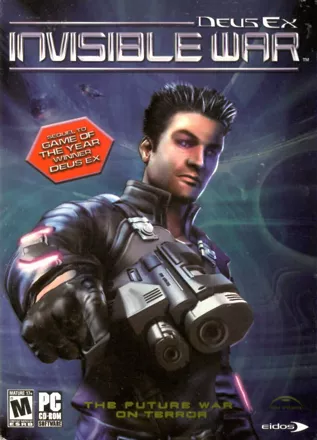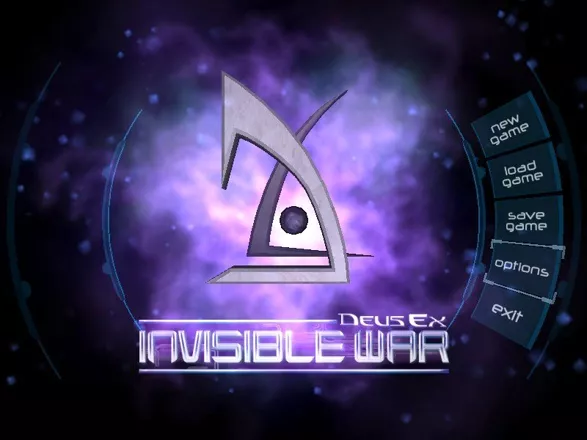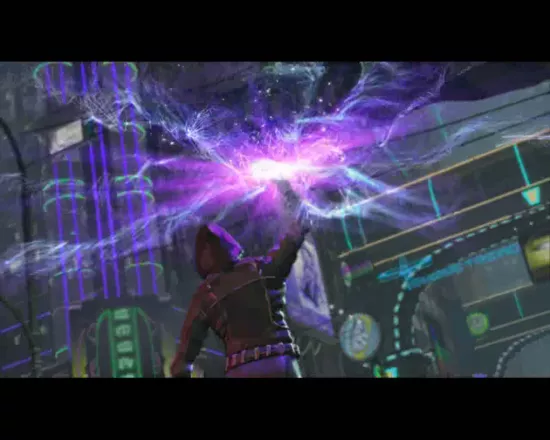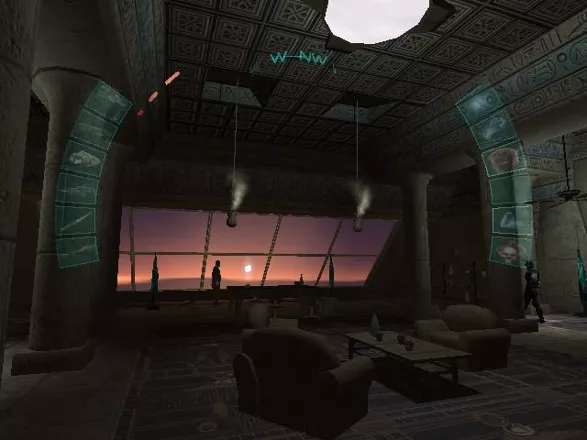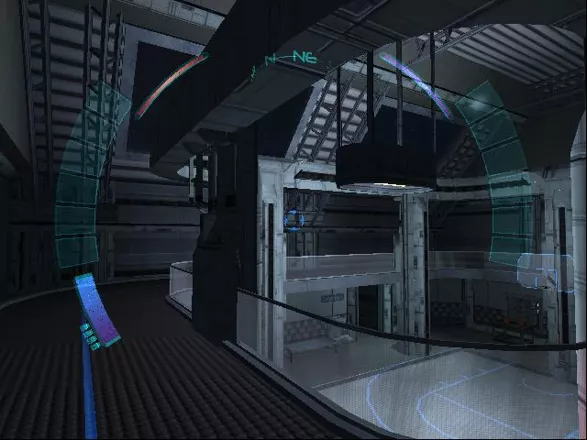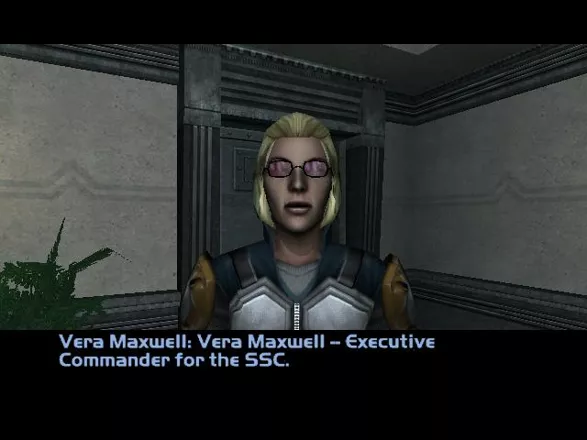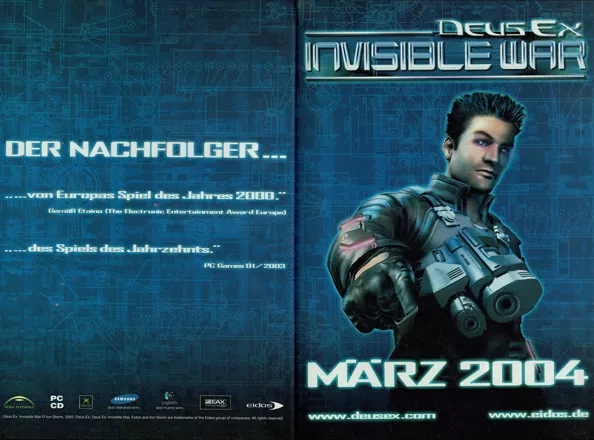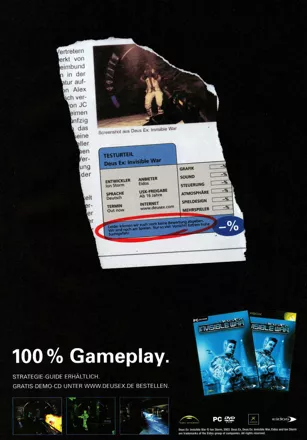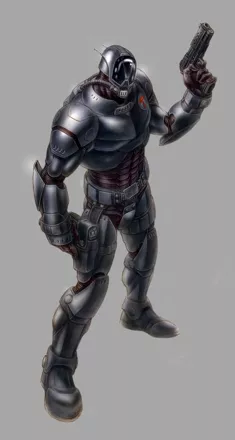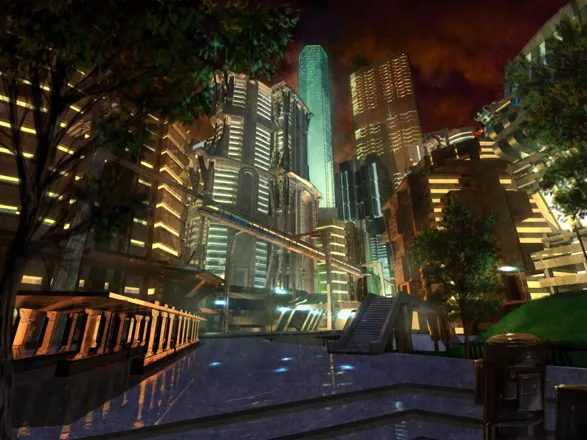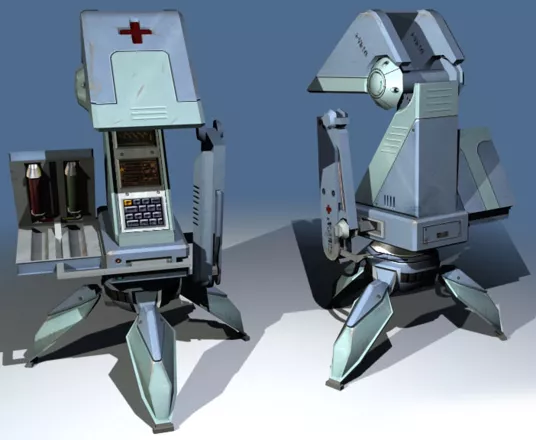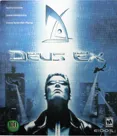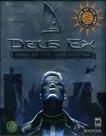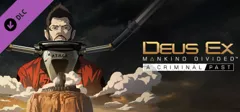Deus Ex: Invisible War
Description official descriptions
Twenty years have passed after the events described in Deus Ex. The actions of JC Denton have eventually led to a period of economic depression, known as "The Collapse". The world is on the brink of chaos after the dismantling of the mighty biotech corporations, and multiple religious and political groups lust after power.
The city of Chicago is destroyed in a devastating energy blast by unknown terrorists. Two trainees of the Tarsus Academy, Alex D and Billie Adams, are evacuated to another Tarsus-controlled facility in Seattle. Shortly thereafter the facility is attacked by members of a religious organization called the Order. Billie admits that she has been collaborating with them, implying that Tarsus may be involved in a conspiracy. It is now up to Alex to find his or her place in the new world, and ultimately shape its fate.
Deus Ex: Invisible War is a first-person shooter that retains many gameplay elements of its predecessor, such as conversations with characters, inventory management, exploration, and mixing various gameplay styles during missions. As in the original game, the style of play helps shape the game as it progresses, from how characters interact with the protagonist to the types of situations encountered. Each potential conflict can be resolved in a number of ways, through peaceful means or through violence, using stealth or a show of force. Hacking computer terminals and unlocking doors with special tools are prominently featured.
Weapons can be modified in a variety of ways, e.g. increasing their rate of fire, silencing the shots, allowing the weapon to shoot through glass, etc. Characters can once again outfit their bodies with an array of biotech parts, some of which include the ability to see through walls, disappear from radar, regenerate from critical hits, or jump forty feet in the air. Unlike the previous installment, there are no true role-playing elements in the game. The player must search for biotech canisters to install and upgrade biomods; however, no experience points are awarded for either completing missions or dealing with enemies. Inventory management has been simplified as well.
The sequel places more emphasis on decisions and different approaches to missions. From the beginning of the game the player has the freedom of performing missions for organizations and people of his or her choice. Like in the first game, several endings can be reached depending on the player's decisions.
Spellings
- 杀出重围:隐形战争 - Simplified Chinese spelling
- 駭客入侵 - Traditional Chinese spelling
Groups +
- 3D Engine: Unreal Engine 2
- Console Generation Exclusives: Xbox
- Deus Ex series
- Gameplay feature: Multiple endings
- Games with 451
- Green Pepper releases
- Middleware: Bink Video
- Middleware: FaceFX
- PC Gamer Presents games
- Physics Engine: Havok
- Protagonist: Cyborg
- Protagonist: Female (option)
- Setting: Arctic / North Pole
- Setting: City - Cairo
- Setting: City - Chicago
- Setting: City - New York
- Setting: City - Seattle
- Software Pyramide releases
- Theme: Hacking / Pseudohacking
- Theme: School
Screenshots
Promos
Videos
Add Trailer or Gameplay Video +1 point
See any errors or missing info for this game?
You can submit a correction, contribute trivia, add to a game group, add a related site or alternate title.
Credits (Windows version)
276 People (233 developers, 43 thanks) · View all
| Studio Director | |
| Project Director | |
| Executive Producer | |
| Producer | |
| Associate Producer | |
| Lead Programmer | |
| Programmers | |
| Additional Programming | |
| Director of Technology | |
| Lead Technology Programmer | |
| [ full credits ] | |
Reviews
Critics
Average score: 79% (based on 64 ratings)
Players
Average score: 3.4 out of 5 (based on 152 ratings with 16 reviews)
Atmospheric, interactive, genre expanding game.
The Good
This game is pretty wicked. Having not played the original and listening to others speak about it I was prepared for a game which gave you choices. By choices I took to mean the fact that beauty of the game would be in delivering a different story for each person playing it depending on the choices you made. Wrong. The choice you are given is which playing style you wish to adopt to complete a quite linear story line. The objectives can vary depending on which factions orders you wish to follow. Achieving these objectives could take the form of basically shooting the enemies, talking your way out of situations or stealth. The beauty of the game lies within the range of methods to play the game the way you want. For instance, you may choose to sneak past a camera using your thermal masking bio-modification, or disabling it with an EMP grenade, or shooting at it with an EMP modified weapon, or destroying it with your 1st person controlled Spy Drone modification or maybe just finding an air vent and seeking an alternative route.
The Bad
The expectancy it created, although to some part by word of mouth. It isn't what I expected as I said because I thought that choosing to do certain objectives and saying certain things would effect the story line of the game but it doesn't, it affects the path you take to the final and only real interactive choice in the game, the end. I found it hard not to do all the objectives I could in my goals list, which meant following multiple factions wishes, which seems to be against what the game is trying to achieve, I think.
Also I thought the story was overcomplicated. Many people will probably love this, but I couldn't be bothered to take in all the long winded, long words that some of the characters spout.
The Bottom Line
A unique 1st person game which expands the genre nicely.
Xbox · by Gareth Day (7) · 2004
Not as good as the original but it's still Deus Ex
The Good
- Graphics are good and fitting for a game coming out late 2003.
-
Sound and music are appropriate for the game. The Main Title Theme is the best as it pays tribute to the original Deus Ex theme.
-
Voice acting is done well, except for a couple of poorly done foreign accents.
-
You get to meet up with many familiar faces from the original series (but no Smuggler :( )
-
Combat is simplified which makes it much more accessible to gamers at large.
-
All the wonderful plot twists and conspiracy theories that made you love the original Deus Ex.
-
Multiple endings depending on the decisions you make, like the original
The Bad
- The RPG element that was existent in the original Deus Ex, has been taken away in this one. This makes it less fiddly (e.g. no need to mess around with an inventory determined by a grid) but it also gives the player less choice in making their character a sneaky back-stabbing spy, a gung-ho rocket gunner or an elite sharpshooter. The customisation in your character is now limited to just the biomods available. In the end, Deus Ex 2 feels more like a true FPS than the original. This may appeal to some, but not me. -
The maps are way too small - even the first game had larger maps. I think this may have something to do with the fact that due to the limitations of the Xbox, the levels had to be reduced in size - so this means lots of pre-loading of maps!
-
Universal ammo: All ammo types are the same. This I assume was another aspect that was simplified to make the game less fiddly (and less like an RPG). You're able to modify the weapons somewhat but every weapon uses the same ammunition. That means if you're running out of ammo you won't be able to use ANY gun rather than just a particular one.
-
Smoking 10 cigarettes in a row isn't as entertaining anymore.
-
Dying sequence is not as good as the old one :P.
-
JC was just cooler :).
The Bottom Line
For those FPS players that want to try something different, consider Deus Ex: Invisible War. It's got an interesting sci-fi/cyberpunk/conspiracy theory storyline and a really immersive world (our own one in a dark future). For the RPGers that gave Deus Ex 1 a shot and liked it, you'll probably not be as satisfied with the sequel.
Overall, Deus Ex: Invisible War is a good game. It has a great storyline, great graphics, memorable characters, ambient music that sets the mood and it's fun to play. When stacked against the original though, the original still comes out on top. However, the game is still Deus Ex and IMHO is a much better game than any of the ones out there at the moment :).
Windows · by Rambutaan (2782) · 2004
A sequel designed around the limitations of the Xbox console
The Good
20 years after the events of the original Deus Ex, most of the world is under direct control of two organizations: The commercial and governmental WTO and "The Order", who reject materialism and genetic augmentation. You play a young trainee at the shady "Tarsus" military academy, who finds himself between the fronts of an "invisible war" after a devastating terrorist attack wiped out Chicago. You travel various locations such as Seattle, Cairo and Antarctica. As the game progresses you can choose your allies, find out more about the main organizations, the mysterious cyborg race of the Omar, virtual holographic pop-stars... or the fierce competition between two rivaling coffee chains. There is no distinction between "good and evil", just choices - and consequences.
Yes, you can feel the talent of the original DX team in "Invisible War". The strong backstory can hold its ground and gives the gameplay some purpose. A variety of side quests and places to explore keeps you interested in a science fiction world which happens to be eerily plausible, once you look behind a surface tailored towards FPS gameplay. The action/stealth/diplomacy/hacking mix is still there, once again mixing FPS action with various RPG elements.
Music and voice acting is pretty solid. And the state of the art physics engine makes objects in the game world move a little more smoothly and realistically.
The Bad
But something is missing. And the more you look at it, the more you realize that about 2/3 of the game mechanics of the legendary predecessor have simply been cut without replacement - to make the game work on an Xbox.
That isn't just blind and paranoid jealousy towards a new platform. No, the developers were quite frank about how the memory restrictions of the console caused significant limitations which show in the ridiculously small level size, for example. While the first Deus Ex sent you on a mission on a life-scale rendition of Liberty Island, most of the levels in DX:IW consist of (literally!) 3 rooms and a connecting corridor. It just feels cramped, linear (yet you still get lost all the time!), claustrophobic and... unimmersive. Plus the prospect of seeing a loading screen every 25 meters gets annoying quickly.
Then there is the horrible interface. Let me try to explain it in pain inducing detail:
It starts with the HUD taking up 40% of the screen in a most annoying, circle-style layout. Text is in 24pt headline-size, so even small paragraphs of text which pop up frequently throughout the game go over multiple pages in tiny windows with huge, circle-shaped decorations on the side when they could as easily be of a smaller, more comfortable size appropriate for reading on PC monitors. Then there is the complete ignorance towards the possibilities of mouse input. No scroll-bars, no buttons to click for even the most obvious of tasks. Sometimes, the intro screen doesn't recognize mouse clicks and you have to navigate using Arrow Keys, Enter and Esc (that would be the 2 button + joypad controls the interface has clearly been designed for).
There are no quick save/load keys. Apparently, you cannot even change binds for items and augs for both of which only 6 slots are available anymore. The inventory has been reduced to 12 (maximally 15) indiscriminately-sized slots which individually do not distinguish between, say, a flame thrower and a soda can. Clicking stuff in the inventory and clicking another item makes the positions in the inventory switch instead selecting the next item. Drag and drop? A foreign concept to DX:IW. Annoying, to say the least. To bring up weapon modifications, you have to press the tab key(?!?) while having selected a weapon. Otherwise the tab key just throws stuff away. Because of the ridiculously big text and window-decorations, information for each item is reduced to a single sentence and ugly icons planted thoughtlessly into the middle of the screen. The rest of the space is used for permanent key-mapping info (because honestly, who would think of pressing the tab key to install weapon mods?). Every icon looks a slight bit too low res on every resolution above 800x600. Did I mention that I hate the "Neuropol" font? Normally, I wouldn't even bring that up, but it simply fits the whole story of one aimless and over-styled interface that singlehandedly manages to destroy a large part of the game's look and feel.
It doesn't stop there, however. DX:IW does not support wide-screen monitors, among other graphics-related bugs. The field of view is reduced to a smallish 68°, yet another thing to make perspective look more natural on far-away television screens - and bloated on PC monitors. Occasionally auto-aim switches on for no reason. Huge, white sparks fill the screen when punching a wood crate with a baton, adding to the Street Fighter style of graphics FX. I could go on.
To be fair, various of these issues have been addressed with a patch, but the list simply goes on and on and there is a philosophy to the game's design that simply cannot be fixed: This is a game built exclusively for the Xbox... and then ported to PC.
In order to make the gameplay more streamlined, everything but the most vital game mechanics were cut. Skill points? No more. Just genetic nano augmentations, most of which are identical to DX1's. The concept of settling for specific augmentations being a tough, one-time choice has also been removed by making them replaceable. Weapon mods are still available but now a pistol cannot shoot further than 20 meters without a "range modification"? And did I mention that there is only ONE TYPE OF AMMO FOR EVERY WEAPON?
What is really unfortunate is that they weren't even able to truly improve on the graphical issues that already plagued the first Deus Ex. DX:IW might indeed have been the first game to support real-time stencil shadows, yet the game makes no aesthetic use of it. The walls look as bland and gray as in IW's predecessor. And thanks to the unnaturally sharp shadows and emotionless faces, characters still look as if they were made out of plastic.
The Bottom Line
I remember the shock from playing the DX:IW demo for the first time. This was supposed to be the sequel to one of the best games of its generation?
I only picked up the full version for a bargain bin price, years later. Admittedly, like the first one, the game becomes better after playing for a few hours, yet it still feels disappointingly small compared to its predecessor. So many gameplay options were simply cut without any new, innovative features to replace them. It's a game designed around limitations instead of pushing the limits. It feels like a game so afraid to overexert players, it decided to rather bore them instead.
Worth getting if you keep your expectations low - but certainly not a game worth the Deus Ex title.
Windows · by Lumpi (189) · 2009
Discussion
| Subject | By | Date |
|---|---|---|
| It's not that bad! | Unicorn Lynx (181780) | Sep 15, 2011 |
| Screenshots | Cantillon (76884) | Sep 8, 2011 |
| Dynamic Lighting | St. Martyne (3648) | Nov 15, 2008 |
Trivia
Basketball
Continuing the Warren Spector tradition, Invisible War features a basketball court. It's right at the beginning of the game and there's no missing it; one of your mandatory objectives will send you through there.
Engine
Ion Storm licensed the Unreal engine and heavily modified it for this game. Its a inhouse engine with a tiny bit of Epic's Unreal code left in. It is said that the engine programmer left mid-development with a largely undocumented code which caused the game's numerous technical problems.
Music
In order to bring popstar NG Resonance's music to life, Eidos licensed a few tracks from the industrial/techno band "Kidney Thieves". Said tracks can be found in their Trickstereprocess album. The original soundtrack for the game on the other hand, can be downloaded for free on Eidos's site.
References
The coffee shops, Pequod's, and QueeQueg's are from Moby Dick. The Pequod, was the name of the ship. QueeQueg is the Indian harpooner.* In the abandoned curio shop over the 9 World Taverns, you can find a book containing text on the care and cleaning of Ohio State Bobbleheads. Chris Carollo, the lead programmer for Invisible War is an Ohio State alumni. * The Tarsus Academy shares a name with the city that was the birthplace of Paul, the apostle. Paul Denton acts as the apostle for J.C. Denton.
Awards
- 4Players
- 2004 – Best Console Story of the Year
- GameSpy
- 2003 – #7 Game of the Year
- 2003 – #3 Xbox Game of the Year
- 2003 – #5 PC Game of the Year
- GameStar (Germany)
- Issue 04/2009 - One of the "10 Most Terrible Sequels" (It is a good game in its own right but it changes everything which made Deus Ex big for the worse, e.g. exciting story, clever level design, RPG elements and freedom of decision.)
Information also contributed by MasterMegid, Scott Monster and Zovni
Analytics
Upgrade to MobyPro to view research rankings!
Related Sites +
-
Deus Ex 2
Official Web Site -
Deus Ex: Invisible War Post-Mortem
Warren Spector and Harvey Smith speak about the development and shortcomings of Deus Ex: Invisible War (Youtube) -
Hi-Res Textures for Deus Ex: Invisible War
Download a pack containing hi-res replacement textures for the game. -
Kidney Thieves official site
Site of the industrial/techno band Kidney Thieves, who contributed to Invisible War's soundtrack.
Identifiers +
Contribute
Are you familiar with this game? Help document and preserve this entry in video game history! If your contribution is approved, you will earn points and be credited as a contributor.
Contributors to this Entry
Game added by Jeanne.
Xbox added by Jason Walker.
Additional contributors: xroox, Zovni, Unicorn Lynx, Shoddyan, Paulus18950, Patrick Bregger.
Game added December 6, 2003. Last modified March 19, 2024.
